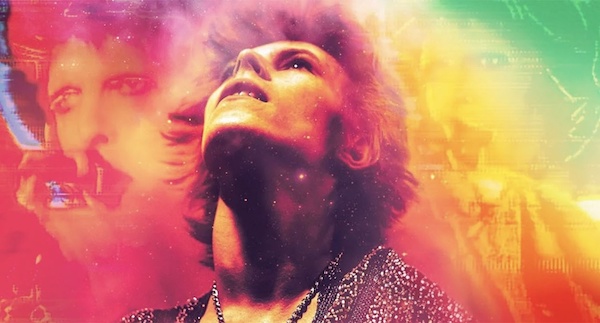Film Review: Geek Out in “Moonage Daydream.” Oh, Yeah!
By Ed Symkus
A new documentary artfully and excitingly suggests what made David Bowie tick.
Moonage Daydream is playing at AMC Boston Common 19, AMC Assembly Row 12, and Showcase Cinema Randolph.

David Bowie, the subject of the innovative documentary Moonage Daydream.
The first thing I did after watching writer-director Brett Morgen’s energetic yet contemplative peek into the life and psyche of David Bowie was to don my headphones, cue up Soul Love (my favorite track from Ziggy Stardust and the Spiders from Mars), and blast it. The song is nowhere to be heard in the film, and my appetite for it had been whetted.
That’s not the only slice of Bowie that’s missing from Moonage Daydream. There’s nary a mention of his eyes being two different colors or his saxophone playing or his first wife Angie or his son Duncan Jones or the fact that Bowie is no longer with us, that he died on January 10, 2016, two days after his 69th birthday.
But those are minor complaints, and I am embarrassed to be nitpicking about a film that approaches its iconic subject in such an innovative manner. Morgen (Crossfire Hurricane, Jane) never even pretends to be making a by-the-numbers biopic. Instead, he presents selective pieces of the rock star-songwriter-painter-sculptor-actor’s story, all told in Bowie’s voice, sometimes in television interviews, sometimes via aural snippets, looking back at what was going on inside his head throughout his career.
The film opens with that voice discussing the concept of the word “time,” then launches into the first of many musical sequences, starting with Hallo Spaceboy (1995), accompanied by a busy collage of space-related images, crowds of people, and horror films. It soon segues to Bowie onstage in 1972, singing Wild Eyed Boy from Freecloud (1969). Every performance shown, from this one up through a 1997 tour, is strong, and the sound quality of every note sung and played is bright and clear.
While Morgen is generous with his inclusion of the musical segments, it’s his use of spoken words and a scattering of stylistic visuals that elevates the film. And it’s the TV interviews, which I could not get enough of, that make the film shine.
None of the interviewers is named, and the only one I recognized was Dick Cavett, but all of them had the mettle to ask Bowie some very personal questions, and he never shied away from answering them in thoughtful, erudite, profound, and often funny ways.
Why do you have so many different stage personas?
“Being a Capricorn, I didn’t want to expose myself to the public, so I invented a series of characters.”
Are you a spiritual person?
“I was a Buddhist on Tuesday and was into Nietzsche by Friday.”
What kind of childhood did you have?
“Incredibly ordinary; I went to school, I ate.”
What about the [sparkly platform] shoes you’re wearing? Are those men’s shoes or women’s shoes or bisexual’s shoes?
“They’re shoe shoes, silly!”
Other topics Bowie broaches, whether being asked about them or just bringing them up himself, include the idea of individuality, the role of the artist in society, the fact that he shelters himself from love because it could get in the way of his art, why his style of music was constantly changing, why he was always jumping between different mediums of artistic expression. He’s very open about all of this, as he is when there are brief mentions of his second wife, the supermodel Iman, and his older brother Terry, who influenced much of his outlook on life.
The film makes him come across as far less enigmatic than he’s been perceived. Kudos to Morgen for making sure not only to point out but to show samples of Bowie’s creative diversity, from those often wild music performances to scenes from his films (The Man Who Fell to Earth, Merry Christmas Mr. Lawrence) and his stage work (The Elephant Man).
Setting a personal challenge to choose my three favorite moments from the film, I came up with these: the sight and sound of Bowie laughing, a montage of two dozen of his remarkable acrylic paintings, and a live version of Space Oddity with just him and his 12-string acoustic guitar.
Ed Symkus is a Boston native and Emerson College graduate. He went to Woodstock, is a fan of Harry Crews, Sax Rohmer, and John Wyndham, and has visited the Outer Hebrides, the Lofoten Islands, Anglesey, Mykonos, the Azores, Catalina, Kangaroo Island, and the Isle of Capri with his wife Lisa.
